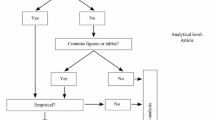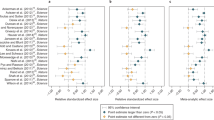Abstract
Do academic publication standards reflect or determine research results? The article proposes minimal criteria for distinguishing useful ‘unpublishable’ results from low-quality research, and argues that the virtues of negative results have been overlooked. We consider the fate these results have suffered thus far, review arguments for and against their publication and introduce a new initiative – a journal to disseminate negative results and advance debate on their recognition and use.
Similar content being viewed by others
Notes
We draw particular inspiration from the typologisation of negative results in computer science in Prechelt (1997).
Debates on grounded theory, data mining and exploratory data analysis (Begg and Berlin, 1988; Simon, 1988) must be reserved for a future article.
We are indebted to such pioneering efforts in medical, computer and other sciences such as the Journal of Negative Results in Ecology & Evolutionary Biology (www.jnr-eeb.org), the Journal of Negative Results in Biomedicine (www.jnrbm.com) and the Forum for Negative Results of the Journal of Universal Computer Science (www.jucs.org).
A summary of the survey results is available on the website www.jspurc.org and from the authors upon request.
References
Adcock, R. and Collier, D. (2001) ‘Measurement validity: a shared standard for qualitative and quantitative research’, American Political Science Review 95: 529–546.
Baert, P. (2005) ‘Towards a pragmatist-inspired philosophy of social science’, Acta Sociologica 48 (3): 191–203.
Bartels, L.M. (1997) ‘Specification uncertainty and model averaging’, American Journal of Political Science 41: 641–674.
Beck, N. and Katz, J.N. (1995) ‘What to do (and not to do) with time-series cross-section data’, American Political Science Review 89: 634–647.
Beck, N. and Katz, J.N. (1996) ‘Nuisance vs. substance: specifying and estimating time-series cross-section models’, Political Analysis 6: 1–34.
Begg, C.B. and Berlin, J.A. (1988) ‘Publication bias: a problem in interpreting medical data’, Journal of the Royal Statistical Society 151 (Series A): 419–463.
Begley, S. (2006) ‘New journals bet ‘negative results’ save time, money’’, Wall Street Journal, 15 September.
Boruch, R. (2006) ‘The null hypothesis is not called that for nothing: statistical tests in randomized experiments’, Journal of Experimental Criminology, forthcoming.
Breslow, J.M. (2006) ‘A glance at The Journal of Spurious Correlations: a new journal’, The Chronicle of Higher Education, 2 October, http://chronicle.com/temp/reprint.php?id=bjtfvwlb77y9hz1fldwjlzr3y3sqzh8b.
Bryant, F.B. and Wortman, P.M. (1984) ‘Methodological Issues in the Meta-Analysis of Quasi-Experiments’, in W.H. Yeaton and P. M. Wortman (eds.) Issues in Data Synthesis: New Directions for Program Evaluation, San Francisco: Jossey-Bass, pp. 5–24.
Cartwright, N. (2004) ‘Well-ordered science: evidence for use’, Paper presented at the Biennial Meeting of the Philosophy of Science Association, 18–20 November, Austin, USA.
Cartwright, N. (2006) ‘Causal claims: warranting them and using them’, Paper presented at the Universidad del Pais Vasco Ninth Summer School, July 10–16, Madrid.
Fölster, S. (1995) ‘The perils of peer review in economics and other sciences’, Journal of Evolutionary Economics 5: 43–57.
Gans, J.S. and Shepherd, G.B. (1994) ‘How are the mighty fallen: rejected classic articles by leading economists’, Journal of Economic Perspectives 8 (1): 165–179.
Gelman, A. and Stern, H. (2005) ‘The difference between ‘significant’ and ‘not significant’ is not itself statistically significant, http://www.stat.columbia.edu/~gelman/research/unpublished/signifrev.pdf.
Gerber, A.S., Green, D.P. and Nickerson, D. (2001) ‘Testing for publication bias in political science’, Political Analysis 9 (4): 385–392.
Gerber, A.S. and Malhotra, N. (2006) ‘Can political science literature be believed? a study of publication bias in the APSR and AJPS’, Paper presented at the Annual Meeting of the Midwest Political Science Association, 12–15 April, Chicago.
Granger, C.W.J. and Jeon, Y. (2004) ‘Thick modeling’, Economic Modeling 21: 323–343.
King, G. and Zeng, L. (2006) ‘The dangers of extreme counterfactuals’, Political Analysis 14 (2): 131–159.
Kittel, B. and Winner, H. (2005) ‘How reliable is pooled analysis in political economy? The globalization-welfare state nexus revisited’, European Journal of Political Research 44: 269–293.
Kotze, J., Johnson, C., O’Hara, R., Vepsäläinen, K. and Fowler, M. (2004) ‘Editorial: the journal of negative results in ecology and evolutionary biology’, Journal of Negative Results - Ecology & Evolutionary Biology 1: 1–5.
Laumann, E., Gagnon, J.H., Michael, R.T. and Michaels, S. (1994) The Social Organization of Sexuality in the United States, Chicago: University of Chicago Press.
MacCoun, R.J. (1998) ‘Biases in the interpretation and use of research results’, Annual Review of Psychology 49: 259–287.
Mahoney, M.J. (1977) ‘Publication prejudices: an experimental study of confirmatory bias in the peer review system’, Cognitive Therapy and Research 1: 161–175.
Prechelt, L. (1997) ‘Why we need an explicit forum for negative results’, Journal of Universal Computer Science 3 (9): 1074–1083.
Presser, S. and Stinson, L. (1998) ‘Data collection mode and social desirability bias in self-reported religious attendance’, American Sociological Review 63: 137–145.
Scargle, J.D. (2000) ‘Publication bias: the ‘file-drawer’ problem in scientific inference’, Journal of Scientific Exploration 14 (1): 91–106.
Scheines, R. (2002) ‘Computation and causation’, MetaPhilosophy 33 (1): 158–180.
Sigelman, L. (1999) ‘Publication bias reconsidered’, Political Analysis 8: 201–210.
Simon, R. (1988) ‘Comment on Begg and Berlin’, Journal of the Royal Statistical Society 151 (Series A): 419–463.
Skloot, R. (2006) ‘Publication probity’, New York Times Magazine, 10 December, http://www.nytimes.com/2006/12/10/magazine, 10 December, 4. html?ex=1323406800&en=b2948892b7417c1b&ei=5090&partner=rssuerland&emc=rss.
Thaler, R.H. (1987–2001) ‘Anomalies’, series in The Journal of Economic Perspectives.
Tourrangeau, R. and Smith, T.W. (1996) ‘Asking sensitive questions: the impact of data collection mode, question format, and question context’, The Public Opinion Quarterly 60: 275–304.
Travis, G.D.L. and Collins, H.M. (1991) ‘New light on old boys: cognitive and institutional particularism in the peer review system’, Science, Technology, and Human Values 16: 322–341.
Wilson, S.E. and Butler, D.M. (2007) ‘A lot more to do: the promise and peril of panel data in political science’, Political Analysis, forthcoming.
Zamora Bonilla, J . (2002) ‘Scientific inference and the pursuit of fame: a contractarian approach’, Philosophy of Science 69: 300–323.
Author information
Authors and Affiliations
Corresponding author
Rights and permissions
About this article
Cite this article
Lehrer, D., Leschke, J., Lhachimi, S. et al. negative results in social science. Eur Polit Sci 6, 51–68 (2007). https://doi.org/10.1057/palgrave.eps.2210114
Published:
Issue Date:
DOI: https://doi.org/10.1057/palgrave.eps.2210114




